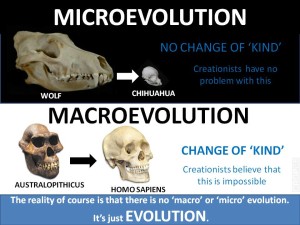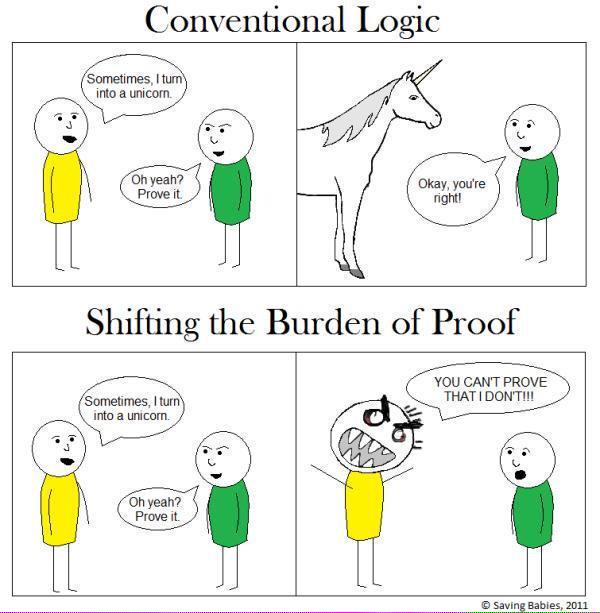Last Updated on 2022-07-08 by Joop Beris
The fourth part of the debate that wasn’t a debate, a conversation I had with Makayla, over on Twitter. The first part can be read here and the second part can be found here, the third part is here. I recommend you read those before reading this part.
In the previous part of this conversation, we explored the question: “How can we know what is true and what is evidence?” From there, we arrived at evolution and morality. We pick up the discussion there. Eventually, the discussion returned to evidence.
Disclaimer: Makayla gave her permission for the creation of this post and it’s follow-ups. I promise to represent her part faithfully though for brevity, I will have to condense both her and my points.
Theists often have a seriously warped understanding of evolution, as I explored in more detail here. They do not understand what is meant by evolution, don’t understand how it works or simply deny that it is a scientific fact, claiming it is just another “faith”. Let’s look at what Makayla think evolution means.
Evolution and morality
Was I mistaken by what you said “we are a species of evolved primate, essentially no different from any other plant or animal species that inhabits this world”? if that not so, can you explain for me why are humans valued more than plants or animals then. Would we not treat everything the same if we are no different? Why do I not see humans on leashes or in cages or why plants and trees destroyed for our use everyday and yet if a human is treated so everyone is in an uproar?
Also if we are evolved primates of monkeys, may you explain why are they not macro-evolving today as anything else? A monkey plus a monkey still has the outcome of a monkey today, same for any other animal. Now I do understand that there are different breads of animals. Like for example dogs but essentially it’s still a dog right no matter how you cross bread? And I do understand there are animals like the zedonk which is a zebra and a donkey but someone had to make them mate in order to get them to be that way it was not done naturally and even then, animals like that once they are made, they are sterile so how do they continue to reproduce unless someone goes back and does the same thing all over again dunces its not natural for them to do so?

If macro evolution is occurring still since that is how everything had to be made from particles, may you give an example of something that is evolving today in that way without men’s involvement of it in labs or in any other form?
As we can see, Makayla mistakenly believes that we monkeys are not evolving today, as if a monkey would give birth to something not a monkey suddenly. Of course, that’s not how evolution works.
Answer: Yes, I think you were mistaken. I said we are an evolved species of primate, just like all other living beings in this world have evolved. I was not saying that a flatworm has the same value as a human being, if you can place a value on a living creature. All life is precious. You do not see humans on leashes or in cages? You do see humans in cages and on leashes and killed in all kinds of nasty ways. I assume you watch the news? Humans can and do treat other humans terribly, just like you’d expect from apes.
There is no such thing as macro-evolution or micro-evolution. These things only exist in the mind of theist apologists, not in evolutionary biology. It stems from a fallacious understanding of the process of evolution. Evolution is a process by which organisms change over time. Most of the time, these changes are small but it is nonsense to claim that lots and lots of small changes over a long time do not equal some pretty big changes.
Yes, we do see humans treated like that but the difference is we have a justice system against that kind of behavior and animals or plants do not.
So if there is no macro nor micro evolution… And it’s just evolution from which organisms change over time, then where did the first organisms come from?
Answer: That’s because we have developed a moral code and ethics because we happen to be a bit smarter than most of our brothers and sisters in the animal kingdom. We need it in order for our society to function. However, rewind the clock some 300 ~ 400 years, when society, law and morality was still heavily under the influence of the church…

Where did life come from? We have some ideas about that, but no definite answer yet. Maybe we’ll never know. That doesn’t mean you can therefore insert any old explanation. Science doesn’t know, therefore God did it is not a valid reasoning process.
There has never been a scientific answer to anything that was dismissed because religion came up with a better explanation for something. Not once in the history of scientific research. It’s always been the other way around. Don’t you find that puzzling?
How did humans get such internal instinct of morals if it’s not something that can evolve? How did the first human in existence then know the difference between right and wrong without being designed that way. Cleary it can’t be the influence of religion because it had yet to exist if it was the first human being? If scientists don’t have definite answer, can they then say honestly that the possibility of God not existing is 100%? There done all the research of existence without God and came up in inconclusive. So what happens if they research with God in the equation just to even rule Him out 100% if He doesn’t exist. But scientists haven’t proven He doesn’t exist. Only assume He doesn’t.
If a man doesn’t know 100% everything, can he 100% rule out God?
As many theists, Makayla appears to believe that it requires faith to be moral and that morality came from God. Of course we also see the age-old “God of the gaps” argument: if science doesn’t know how life appeared, how can it rule out God?
Answer: Even animals display moral behavior, it’s not unique to humans. Animals living in groups need to have some code of behavior. There’s no reason this could not have evolved along with the behavior of living in groups.
Science doesn’t say that God does not exist. The reason for that is simple: you can’t prove a negative because you can’t find evidence of non-existence, you can only find evidence of existence. I’m not ruling God out, the problem for people who believe is that there is no basis on which to rule God in. No evidence.
We call faith “faith” because it is not knowledge. If we could know it was true, it would not be called faith. Believing in something is simply pretending to know things you can’t possibly know, which is intellectually dishonest. It’s also dangerous.

Scientific evidence vs. testimonial evidence
If you don’t mind me asking again. Do you have an explanation for how the first human in existence knew the difference between right and wrong if it wasn’t designed that way and if religion had yet to exist?
Well literally, for me, I do have proof. It’s my testimony. But I cannot say that for everyone else who calls themselves a Christian. They have to speak for themselves. But because of scientists critical thinking they do not want to claim testimonial evidence as evidence even though testimonial evidence is used in the justice system during trials. For them it’s too uncertain and also not evidence because they never experience anything for themselves. But say God did exist, and He lets people choose to believe if He exists or not…. Would He reveal himself to those who decide not to? Would He reveal Himself to those who do since they deliberately chose to? For me, it’s a very real experience. God has done things in my life that no scientists can explain. Heck I cannot even explain, but that doesn’t make it any less real. I have my personal testimony as evidence of how Christ has been working in my life long before and after I decided to believe in Him and gave my life up to Him. However, I didn’t know He was even working in my life until I acknowledged His existence and He then showed me.
Answer: That is an unanswerable question for the very simple reason there never was a first human in existence in the way that you understand. There never was a moment in history when two apes gave birth to a human baby. There was also never a moment when the first human got a “Morality 1.0 module” installed. That’s not how evolution works. You have to remember that the concept of “species” is a human construct. We have developed taxonomy as a way to bring order to vast number of organisms in the world. Nature/evolution is not aware of this human construct. It works on organisms, not on species. That means there is no sharp dividing line between apes and what we would call humans. The last common ancestor that we share with current other great apes, lived some 6 ~ 8 million years ago. If you had been around to see it, you would not have been able to see the transition because it would not have been observable. Remember: lots of small changes over a long time?

In a way, you can think of the fossil record as an old style family album, when people still took actual photos. If you leaf through that album, you only see moments, frozen in time. So in one photo, you see cousin Tim as a spotty-faced, awkward youth, you see uncle Ben of whom we no longer speak because of some family row, we see aunt Magda standing behind him. The next photo, cousin Tim has grown up to be a tall, handsome fellow, uncle Ben is no longer there because of said row and aunt Magda is in a wheelchair because of her arthritis. Looking at this album, the changes seem large and sudden. Same as with the fossil record. There are large swathes of time where we have no data, or only fragmentary data, think a corner of a photo. We can still reconstruct the general story but the details are lost.
Our morality developed along with our brains, getting more sophisticated over time. Like I said, other animals display moral behavior too, so it’s not something that we are unique in or that was gifted to us.
You have proof for yourself, you say. You should be able to see why this will not work as scientific proof. Science needs proof that can be verified and repeated by others. Personal testimony, no matter how convincing to you, can not fit that definition and as such, science must discard it. The scientific method demands that it does. Personal testimony is also highly unreliable because our brains are not recorders, they are interpreters of events. So in a sense, you say “I believe because my belief is true for me”. You should understand that this is a completely unconvincing argument. People can believe whatever they want but no amount of belief can make something a reality. It doesn’t matter how sincere your belief is.

For instance, I could believe in fairies, I could draw up hypotheses about where they come from, I could try and find where they live, etc. I can be totally convinced that fairies are real. I may even believe that I have seen fairies and spoken to them. No matter how much I believe that, it doesn’t make it a reality. Sure, I can say things like “I know fairies are real for what they have done in my life” but I think most people would greet this with derision and rightly so.
When you say that “God has done some things in my life that no scientist can explain”, that is a testable knowledge claim. We could examine what you think God has done for you and see if we can come up with a more logical explanation, one that doesn’t require an invisible, unverifiable being to intercede on your behalf. And even if you are correct in saying that no scientist could explain those things, that doesn’t mean that you can therefore make up your own explanation, however tempting that may be.
You also have to wonder that if God exists, He loves us and wants all of us to be saved, why he would choose such a roundabout, unverifiable way of convincing people of his existence. He used to speak to people directly but for some reason He has stopped being so helpful. Why would that be? All those helpful miracles that God used to do, are so far in the past. Like the ten plagues of Egypt, which incidentally the Egyptians failed to record anywhere. How inconsiderate of them. Or it could be that people who say they talk to God, are now correctly diagnosed with for instance temporal lobe epilepsy and they get medical help?
You may have noticed that throughout this discussion, I asked Makayla several challenging questions, all of which she ignored. I think that is too bad because they may have actually led to her becoming more open-minded or even introduce a bit of doubt. Perhaps the cognitive dissonance was too much because at this point, she sought to end the discussion.
Well we could honestly go back and forth for weeks probably about all of these topics and it would be a never ending circle. I guess that’s what you can consider a debate and I don’t necessarily want to get to that. With that, If you don’t mind, I would like to hear your perspective on two last matters.
If someone is in court for another individual framing them for a crime they did not commit, what is their only way claiming their innocence if they do not have evidence of them not committing the crime? Is it not testimonial evidence? So would you say you don’t agree with the justice system of testimonial evidence as being valid? What if you were in that situation? Would you not use testimonial evidence since scientists say it’s not considered evidence and claim yourself guilty to a crime you never committed?
If I may also ask, What do you consider the value of death? Have you by chance heard of near death experiences? Christians AND even atheist have claimed after they had briefly died (literally flat lined and not given anesthesia), they have seen Jesus and came back to life in order to warn others that He is not imaginary. Each has their own story of what their experience was yet how do you explain how all of which their experiences being consistent with each other’s. Would you consider that a fallacy even though they were never given any medications for doctors to say they had hallucinated?
Answer: I agree, I said at the beginning that a debate is not necessarily the best way to approach this. Especially nowadays, when we are supposed to respect all opinions or beliefs as being of equal value while this is clearly not the case.
Certainly, I’ll answer your two last matters and I hope you’ll do me the same favor. As far as legal evidence vs. scientific evidence is concerned, you are conflating two separate things. Testimonial evidence, most often called testimony, anecdotal evidence or hearsay is completely different from scientific evidence. Scientific evidence is unrelated to a person, can be independently verified and is repeatable. None of these apply to testimonial evidence, which is by definition of a personal nature, is sometimes hard to verify independently and can not be repeated. No matter how trustworthy a person may be, personal testimony does not count as evidence in science, even though it may count in a court of law. So yes, if I was in the situation you describe, I would certainly make use of someone’s testimony as part of my defense. However, that does not make testimony valid scientific evidence.
The value of death? I am not sure how to put a value on the termination of life, I’m afraid I don’t understand your question.
Certainly, I have heard of near death experiences. There is a medical explanation for the phenomenon. First though, let’s clear up some misunderstandings. A person “flat-lining” usually refers to the heart stopping. This does not mean that someone is dead, only that death is imminent. There may be a lot of brain activity going on but people undergoing emergency resuscitation are usually not hooked up to EEG equipment. Also, it is not necessary to be under the influence of medication or drugs for people to have hallucinations. The body can produce these on its own without the need for chemicals. The consistency can be easily explained: all subjects of near death experiences possess a human brain, so it is not illogical to assume that their brains react similarly under conditions of low blood pressure, lack of oxygenated blood and lots of interesting chemicals being released by the brain itself as it is dying. There is nothing mystical about this. While it is true that some westerners report meeting Jesus, it is also true for instance that subjects from India report seeing Yamaraja,the Hindu king of death. It appears our near death experiences are culturally influenced and as such are not consistent and therefore inconclusive. The current medical / neuroscience explanation is that the lack of oxygen in the brain causes the brain to hallucinate (no drugs required) as several chemicals are released in this condition, notably DMT. As it stands, yes, using near death experiences as evidence for your brand of faith is a fallacy.
After answering her two questions, I proceeded to ask my two final questions. I decided to try one last time to introduce a moment of doxastic openness by asking what would be reason for Makayla to doubt her faith.
I also have two things that I’d like to ask you as it seems we are about to wrap this up. 1. What did you hope to accomplish from asking me the things you asked and what did you pick up from our conversation? 2. What would be cause for you to doubt your faith?
I did not necessarily hope to accomplish anything. I simply wanted to hear your perspective on your disbelief in God. I am called to respect others for who they are (people) not because of their beliefs or disbeliefs.
As far as a cause to doubt my faith. I do not doubt in it there is no cause not to. Jesus said He is the way, the truth, and the life. No one goes to the Father except through Him. But until the resurrection of Jesus Christ is disproven to have occurred then I am going to continue to stick with my faith. You can dig up the body of every other religious leader that has died and that simply makes them mere men. Muhammad, Confucius, budda, etc… Even Catholics worship Mary. Another mere human that died and didn’t raise from the dead. None of them raised from the dead. Only Jesus raised from the dead, claimed to be God and raised others from the dead. He conquered death. Why trust in people who can be held to physical death when I have a Messiah who is greater than death itself? Same goes for any other man and science because it’s only a tool man uses. So it can be flawed for man himself isn’t perfect. Most religions contradict each other so they cannot all be true. Christianity teaches that there is one God, and that you cannot become God, Mormonism teaches there are many Gods, and that anyone can become their own God. Islam teaches that Jesus is not God in the flesh where Christianity does. (Jesus cannot be both God and not God at the same time) some religions teach we can reincarnate and others do not. Others teach there is not hell while others do. They cannot all be true and they cannot all lead to God or (gods). Truth cannot contradict itself. If God exists, He will not institute a contradictory belief system in attempt to get people to believe in Him. God is not the author of confusion. If He is God, he doesn’t need mans approval.
I could not resist to offer a rebuttal to her response because it clearly showed an unwillingness to examine her faith in a critical manner. And that’s when the debate that wasn’t a debate became really a debate. That’s going to be the 5th and final post on this subject though.


